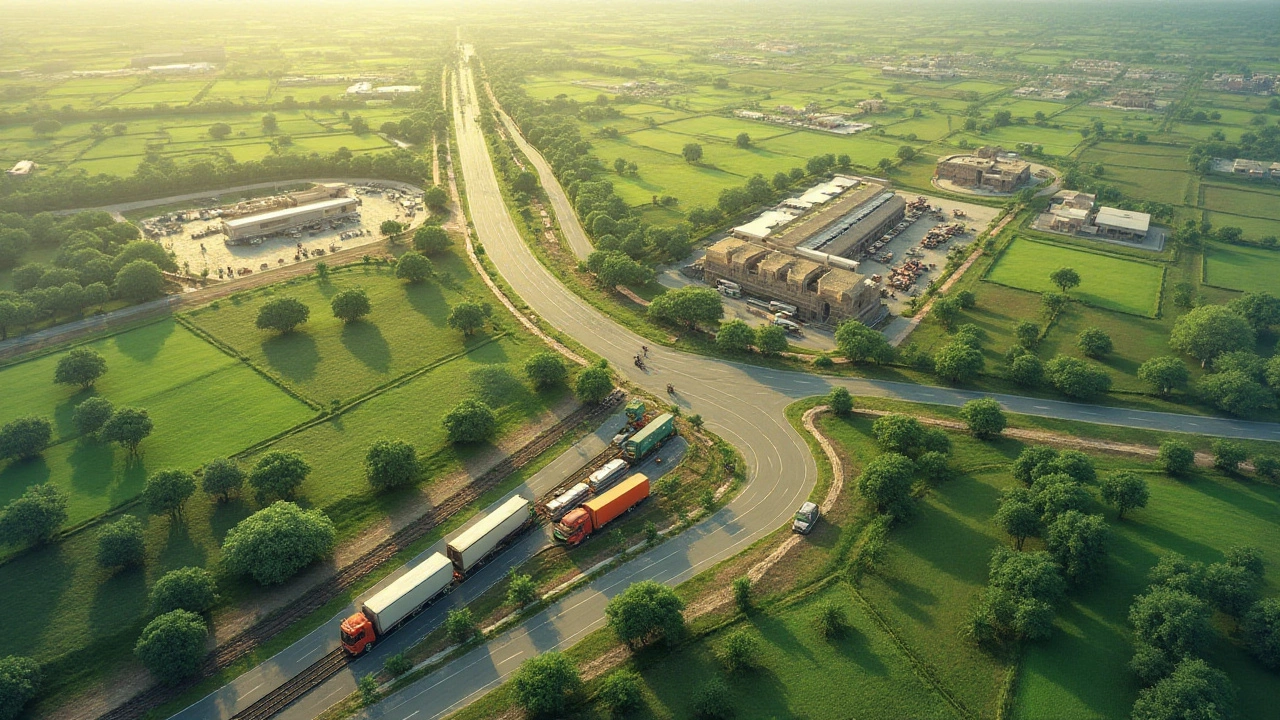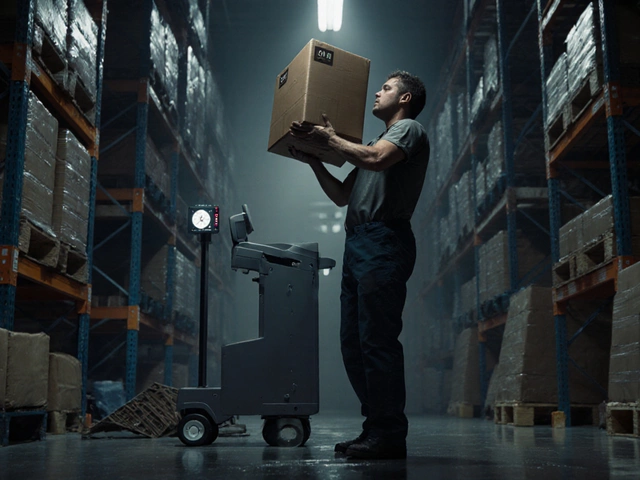Have you ever wondered how goods travel from factories to your doorstep with such precision and efficiency? This is where the magic of logistics companies comes into play. They are the hidden engines that power the global economy, keeping products flowing smoothly across continents.
Logistics is not just about moving things from point A to point B. It's a complex dance that involves meticulous planning, coordination, and execution. Whether it's managing a supply chain or ensuring that a warehouse runs like clockwork, logistics companies have their hands full.
Beyond the tangible act of transportation, these firms delve deep into technology, sustainability, and strategic partnerships to stay ahead in a fast-paced world. Join us as we explore what makes logistics companies tick and how they contribute significantly to businesses around the world.
- Understanding Logistics Operations
- Services Offered by Logistics Companies
- Technological Advancements in Logistics
- Benefits of Partnering with a Logistics Company
Understanding Logistics Operations
At the heart of any successful logistics company lies the bedrock of their operations. The intricate and multifaceted nature of these operations is what makes logistics a fascinating industry to dissect. They ensure that goods move seamlessly from manufacturers to consumers, a process that involves several key stages such as procurement, transport, warehousing, and delivery. Each stage demands precision and clarity for the next to function without hiccups. In recent years, the rise of e-commerce has heightened the need for logistics companies to adapt speedily, putting massive pressure on their logistical frameworks.
Supply chain management, a critical component of logistics, ensures that products are available to customers as promised. A well-oiled supply chain hinges on intricate planning and real-time data analysis. Companies need to navigate the complexities of demand forecasting, inventory management, and production planning. "Supply chains are as fragile as they are complex," wrote logistics expert David Simchi-Levi, emphasizing the importance of resilience in logistics operations. The saying in the industry is, "You're only as good as your supply chain," and it cannot ring truer today. The agility of logistics operations can make or break a company's capability to meet customer expectations and stand the test of market fluctuations.
Technology plays a game-changing role in transforming logistics operations from being reactive to proactive. With advanced analytics, the Internet of Things (IoT), and AI-driven insights, logistics companies can predict patterns and streamline operations more efficiently. Strategic use of technology improves route optimization, reducing fuel consumption and saving crucial delivery times. Companies have leveraged technology to create a dynamic ecosystem where transparency is at its core. Accurate tracking and monitoring have become a norm, providing customers with unparalleled insight into their product's journey. Logistics companies that stay ahead of the curve do so by investing in innovation and embracing logistic technology trends.
Efficiency and sustainability are now central to logistics operations. As businesses grow more conscious of their carbon footprints, logistics providers increasingly focus on reducing emissions. The deployment of electric vehicles and optimization algorithms is lessening environmental impacts while ensuring the delivery of goods remains cost-effective and timely. A 2022 report by Statista revealed that companies focusing on sustainability in transportation significantly reduced their operational costs, which directly benefited the bottom line. These findings provide compelling arguments for businesses to embrace sustainable logistics practices.
Understanding the scope and depth of logistics operations can unlock new avenues for businesses, whether through creating competitive advantages or exploring new markets. Logistics remains a dynamic and integral part of the global supply chain, driving innovation in supply chain management and setting new benchmarks for excellence. For those looking to enter or partner with the logistics industry, embracing core operations and understanding modern advances is key to navigating this exciting domain.

Services Offered by Logistics Companies
Logistics companies provide a wide variety of essential services that play a significant role in global trade and the smooth transit of goods. One of the core offerings is transportation. They ensure that products move efficiently, safely, and on time from manufacturers to the ultimate consumer. Different modes of transport like road, air, sea, and rail are meticulously planned to meet diverse needs. For instance, air freight is often chosen for its speed, especially when urgent shipment is required, whereas ocean freight is cost-effective for bulky goods despite taking longer transit times. The choice highly depends on the client's budget, time constraints, and the nature of goods being shipped.
Another critical service provided is warehousing. It involves storing goods until they are ready to be transported or sold. Modern warehouses are sophisticated hubs with state-of-the-art technology. They implement advanced inventory management systems that monitor, track, and control stock levels. This is crucial in ensuring that there is no overstocking, which can incur additional costs, or understocking, that could lead to potential lost sales. Temperature-controlled warehouses further cater to goods that require specific storage conditions, such as pharmaceuticals or perishable food items.
Apart from these, logistics companies offer supply chain management solutions. They assist businesses in streamlining their operations by optimizing the flow of goods, information, and finances. It's about creating value networks that collaborate continuously to increase productivity and deliver better business outcomes. In this complex web, a logistics company positions itself as a key partner to identify bottlenecks and implement effective solutions. This tailored support helps firms to not only reduce costs but also achieve satisfying customer experiences.
Moreover, involving logistics companies in customs brokerage is an invaluable asset, especially in international trade. They possess the knowledge needed to navigate through the complicated web of global regulations and compliance standards. Proper documentation, tariff classification, and duties payment are handled with precision to prevent any delays or legal fines. In this context, one insightful quote from DHL expresses it well:
"Efficient customs processes not only ensure compliance but also serve as a competitive advantage, enabling faster market entry."
Lastly, many logistics firms provide value-added services like packaging, labeling, and quality inspections. These are crucial for improving the efficiency and effectiveness of the entire logistics process. Packaging, for example, is strategically designed not merely to protect but also to reduce weight and volume, directly impacting shipping costs. Labeling ensures clear, concise information that facilitates easier handling and tracking of goods.
In essence, logistics companies don't just move goods—they enhance the whole supply chain experience. Their diverse suite of services underscores their central role in today's interconnected economy, showcasing their importance far beyond just transportation and warehousing.

Technological Advancements in Logistics
In today's fast-moving world, logistics companies are tapping into cutting-edge technology to streamline processes and improve efficiency. One recent evening, while walking Max, I found myself appreciating the invisible forces that kept store shelves stocked, an odyssey powered by technological marvels. The transition from paper-based systems to digital platforms has been a game-changer. The use of Artificial Intelligence (AI) and Machine Learning (ML) is revolutionizing how logistics companies predict demand, manage inventory, and optimize delivery routes.
Among these innovations, AI often takes the spotlight. With smart algorithms, logistics firms predict trends and make real-time decisions that previously required hours of human labor. Imagine a world where a single click can reroute an entire fleet to avoid traffic delays – it's no longer the future, but today's reality. This automation isn't just about labor reduction; it cuts costs, reduces errors, and speeds up the entire supply chain process. AI-driven analytics provide insights previously deemed impossible, massively enhancing operational efficiency.
The Internet of Things (IoT) is another transformative force within logistics. IoT devices collect data from vehicles, containers, and even individual packages. This treasure trove of information enables businesses to monitor their goods in transit with unparalleled accuracy. From tracking temperature-sensitive documents to ensuring the security of high-value shipments, IoT is indispensable. This data isn't just for real-time monitoring; retrospective analysis helps companies refine their strategies and anticipate potential challenges.
Blockchain technology, often associated with cryptocurrency, is making significant inroads into logistics. With its immutable ledgers, blockchain offers transparent and secure documentation of exchanges. A striking example is how it's used to authenticate product information right from manufacture to delivery. By using blockchain, companies can maintain a reliable record of ownership transfers and reduce instances of fraud. Indeed, the reliability blockchain offers is reshaping trust dynamics within the supply chain network.
Citing a recent report, "By embracing technology, logistics providers stand to increase their operational efficiency by up to 45%."
Robotics, too, plays a key role in modernizing warehouses and transportation hubs. With the advent of autonomous vehicles and automated guided vehicles (AGVs), the efficiency of operations has increased manifold. Tasks such as sorting, lifting, and transporting items, once labor-intensive, are now routinely handled by robots, reducing human error and streamlining operations. In warehouses, drones are beginning to be utilized for inventory scanning, offering a bird's-eye view that radically enhances inventory management.
Integrating these advanced technologies isn't without its challenges. Training staff to adapt to new systems and maintaining cybersecurity in an increasingly digital environment of logistics demand vigilance. However, the benefits far outweigh the costs, as the long-term savings and enhancements in speed and reliability pay dividends. As these technologies become more integrated and cost-effective, logistics companies are leading the trail toward a more connected and efficient global economy.

Benefits of Partnering with a Logistics Company
Teaming up with a logistics company can transform how a business operates, and in today's fast-paced world, this partnership offers an edge that’s hard to ignore. First off, such collaborations lead to cost savings. By outsourcing logistics, businesses no longer need to invest in expensive infrastructure like warehouses or transportation fleets. Think about the resources saved when you don’t have to manage these facilities. Instead, companies can redirect those savings to fuel growth, innovation, or even marketing strategies.
Moreover, logistics firms bring a wealth of expertise and market knowledge. Their deep understanding of supply chains ensures that goods move efficiently and effectively. They are like maestros in the art of transportation, coordinating a multitude of activities such as inventory management, order procurement, and shipment tracking. This proficiency guarantees fewer delays and more reliable delivery times, which in turn boosts customer satisfaction. A satisfied customer is more likely to return, hence fostering loyalty and increasing sales.
Additionally, leveraging a logistics partner allows businesses to expand their reach. Logistics companies have established networks across the globe. Whether it’s navigating the bureaucratic labyrinth of customs or ensuring compliance with international trade regulations, their expertise is invaluable. A local business can suddenly become a global player, tapping into new markets with ease.
"In the world of logistics, partnerships are not just beneficial; they are essential to gaining a competitive advantage," said Sarah Barnes, a respected supply chain analyst.
| Aspect | Benefit |
|---|---|
| Cost Efficiency | Reduces operational costs by outsourcing storage and transportation. |
| Market Expansion | Opens doors to international trade by utilizing established networks. |
| Customer Satisfaction | Improves delivery reliability, hence boosting client trust and loyalty. |
Lastly, the evolution of technology is reshaping the logistics landscape, and by partnering with a capable logistics firm, businesses gain access to cutting-edge solutions. Innovations like AI-driven analytics, real-time tracking systems, and blockchain applications are elevating the efficiency of logistics operations to unprecedented levels. Such technologies provide invaluable data insights, enabling companies to make informed decisions swiftly and accurately. All of these advantages combined make the decision to partner with a logistics company not just a smart move, but a strategic necessity in the modern business environment.





